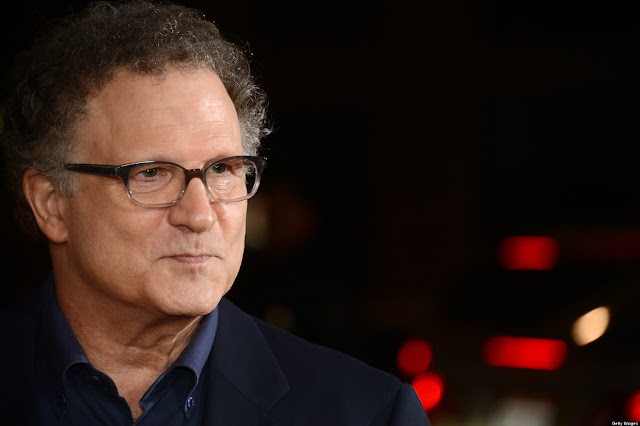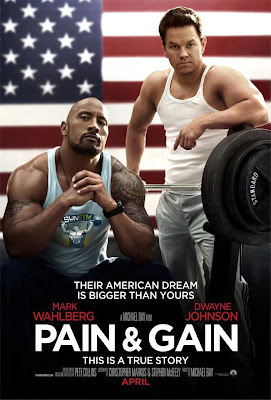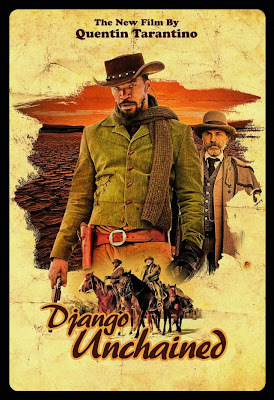More Than A Clown Fish: Ranking The Films Of Albert Brooks
Not that much credit needs to be
given to comedian/writer/director/actor Albert
Brooks for being more than the voice of Marlin in Finding Nemo/Dory, but the man has made seven feature films and I
often find myself not seeing the credit he deserves for his work. All of films written
and directed by Brooks have recently been made available to stream on Netflix
and I took it upon myself to not just watch them all and introduce them to my
girlfriend and my mother, but add some of my own thoughts as well.
7. Looking For Comedy In The Muslim World (2005)
There are two films on this list
that I had not seen until recently and Looking
for Comedy in the Muslim World is one of them. I had known this film did
not receive the best reception upon initial release and I can sort of see why,
but at the same time, this is a film that may have a provocative title, but is
completely fitting for Brooks. Yes, the concept of the American government sending
a comedian to India where he can report on what makes the population laugh
could allow for biting satire, but this is not the same Brooks who made Real Life. Instead, we have a film more
concerned with mining humor out of Brooks being stressed out by the 500-page
(at least) report he is required to put together. There is actually very little
fish-out-of-water humor to be found.
We get the setup and the expected
persona of Brooks, who plays himself and happily mocks his own work, most
notably The In-Laws remake from 2003,
which is balanced by the immense popularity of Finding Nemo from that same year. The film’s best bit comes in the
form of a comedy show Brooks and his government travel companions put together,
serving as a giant test of a variety of comedy. Brooks completely bombs, but
the extended sequence gets everything you want out of what Brooks can do best in
front of the faces of many.
Of course, there is a reason why
the film ranks so low and that is the lack of taking more chances or finding a
suitable ending. This isn’t the first time the ending becomes an issue for a
Brooks film, but ‘Looking For Comedy’
particularly feels like it just stops itself, before managing to sufficiently
answer its own question. Given that it is a Brooks film, the question sort of
morphs into whether or not the Indian people find him funny, but the film, at
the very least, does manage to put Jews, Muslims and Hindus all together and
have them laugh.
6. The Muse (1999)
Getting right to the point first,
I generally believe Sharon Stone to be a terrible actress, suitable for only a
few roles (Casino was easily her
peak). Placing her as the titular character in The Muse is largely fitting, given her role as a lazy, spoiled and
self-absorbed woman who happens to have convinced everyone around her that she
is one of the daughters of Zeus (and of course it led to a Golden Globe
nomination). Whether or not her status as an actual muse is true is not really
the point, as the film gets plenty out of Brooks dealing with all the
particulars of making her satisfied enough to inspire his screenwriter
character to write an amazing script.
The film mainly jumps between
being a character play of Brooks, Stone and Brooks’ character’s wife played by Andie
MacDowell navigating the living arrangements during this musing process and the
mild satire involving Hollywood, which is always ripe for satire. Much of the
fun comes from that Hollywood angle, as Stone’s character can be quite grating.
With the showbiz stuff, the film is cameos abound, as Martin Scorsese, James
Cameron, Rob Reiner and many others all make random appearances, as they seek
out Stone’s muse for help.
Week’s prior in the summer of 1999,
The Muse had a companion released in
the form of Bowfinger, starring Steve
Martin and Eddie Murphy (maybe the last great comedy for both). That film
played heavily into lighthearted Hollywood satire as well. Martin and Brooks
come from an older school of comedy, but the Brooks film only managed to take
things so far. The jokes are mostly fine and the story has an actual
resolution, there just seems to be an element missing to make this a more
impactful film in Brooks’ oeuvre.
5. Real Life (1979)
Real Life is the other film I had not seen before and is also the
feature that seems to channel the darker sensibilities that are not nearly as
apparent in the rest of Brooks’ films. The film is also rather prescient, as it
originated as satire inspired by the PBS series An American Family, only to represent an early form of the reality
television we see now. It manages to bring out an earlier version of Brooks
(playing himself), albeit with a tinge of mean-spiritedness that certainly
works for what the film is going for.
The concept is quite funny and
the film works incredibly well in its opening minutes, as it establishes how we
will be following a regular American family for a year. It means using advanced
cameras worn as massive helmets by a filmmaking team and regularly seeing
Brooks interact with a family far too worried to act natural. The idea is
sound, but the results are problematic to say the least for the people involved
in this movie within the movie. Charles Grodin stars as the head of the
household and is involved in one of the film’s more hilarious sequences, as he
botches a surgery (he plays a vet) due to nervousness in front of the camera.
It’s the episodic elements involving
the family that largely find this film at its best in fits and starts. Meanwhile,
Brooks plays himself as a fame-seeking narcissist who goes through his own
emotional breakdown during the production of this film. While having made a
number of shorts, this directorial debut certainly has ambition that is only
undone a bit by a need to fine-tune what Brooks is more capable of, namely in
making Brooks less pushy. That said, the disagreements his fiction version of
himself has with the psychiatry experts concerning his impact on the family allow
for even more hilarious moments.
4. Modern Romance (1981)
It’s very easy to look at Albert
Brooks as a west coast Woody Allen, given his gift for dialogue and self-depiction
as a neurotic individual that is still generally smarter and in possession of
more edge than many around him. With that in mind, it’s very easy to see Modern Romance as Brooks’ Annie Hall. The two films are not very
similar, aside from being somewhat offbeat romantic comedies, but they play on
what it is to deal with issues that plague relationships from their perspectives.
The main issue in question for Modern
Romance stems from Brooks’ inability to determine if his girlfriend is
right for him.
Some hail this as Brooks’
masterpiece and given a couple bravura sequences involving Brooks high on Quaaludes,
shopping for running shoes and working on sound effects for a film he is
editing, it is easy to see why. In addition to a lot of smart work involving
Brooks’ commentary on relationships and the hilarious predicaments he puts
himself in due to his characters’ intense jealousy, there is some great comedy
here. Brooks and his frequent collaborator Monica Johnson have put together a
clever screenplay that makes the most of Brooks’ self-loathing, following the
breakup he initiates at the beginning of the film.
Still, as funny as the film is,
there is the same issue involving the ending that seems to cut the film short
of rounding out itself to make for ultimate satisfaction. There is also the
matter of Kathryn Harrold as Mary, Brooks’ leading lady for the film who lacks a
quality to match him. The character is lacking in much of a personality, which
is exactly what is corrected in the films ahead. Those issues aside, Brooks
plays well here and gets a great sparring partner in the form of Bruno Kirby,
who is maybe at his most understated, given the manic nature of Brooks this
time around.
3. Mother (1996)
After meeting with Nancy Reagan,
Doris Day and Esther Williams, Brooks managed to have Debbie Reynolds take a
lead role in a film for the first time in 27 years. The result is one of Brooks’
best characters, as Beatrice Henderson is a perfect foil for John Henderson.
There is a clear evolution in the status of the various characters Brooks plays
in his films and Mother finds Brooks
in the role of a middle-aged, twice-divorced sci-fi writer. In an effort to
deal with his problems with women and his own writer’s block, the character
moves back in with his mother.
It’s a straightforward concept
that comes naturally for Brooks. A lesser film could simply play up the eccentricities
written for Reynolds to embody as an elderly mother against the neurotic nature
of Brooks’ character, but something special happens instead. This is a film with
gags and humor, but no jokes. It is another character-based comedy and it
happens to be very sweet, as we watch a son rebel against the ways of a mother
who has accepted a certain state of normalcy that begins to deteriorate as she
is poked and prodded by her second-favorite son.
Rob Morrow co-stars in this film
as Brooks’ younger brother, a mama’s boy, and the film has great fun in showing
how these two differ. He’s also the center of minor conflict in where the film
goes, but this is not a high stakes story. It’s discreet in its presentation,
but effective in all the right ways. Perhaps the most notably quality is how
the film allows itself to shift perspectives. While there is closure for both characters,
the film’s final moments with Brooks are notably weaker than that of the
mother. It’s a wise move and quite touching, even if it doesn’t match the
hilarity that comes from how Reynolds and Brooks talk about eating, shopping
for and storing food.
2. Lost In America (1985)
Mother is currently the highest grossing film made by Brooks, but Lost in America may be his all-around
most successful. It’s the comedy that took him from being a respected comedian
to getting acknowledgement as one of the funniest men in America. It hits a lot
of the sweet spots found in the comedy of Brooks, including at least two of his
best scenes (when he is fired and a debate with Gary Marshall’s casino owner
character). This is also the film that really does feel held up by a decision
to conclude the film with an abrupt stop, rather than see where things go.
Lost in America concerns a yuppie couple (Brooks and a very
well-cast Julie Hagerty) who decide to get out of their jobs, sell their house
and live their lives cruising America in a Winnebago. Complications immediately
arise when Hagerty loses all the money gambling during their first stop in Las
Vegas. While the film begins as a way to show us how Brooks’ lack of
satisfaction in his life comes from having what he considers good-not-great
things (house, car, job), the film makes an amazing turn in how it pushes him
to play into the idea of wanting exactly the opposite.
Using Easy Rider as his mantra, Brooks’ David Howard is the epitome of a
yuppie set loose. The twist of having Hagerty be the one to create a huge
problem for the couple is a welcome one, as it allows the film to play on some
satiric ideas as well as explore the depth of a relationship and what kind of
values are needed in an effort to stay together during even the worst of times.
1. Defending Your Life (1991)
On an alternate timeline, Defending Your Life would have the same
kind of legacy that Groundhog Day has
obtained. While the Bill Murray classic explores the meaning of life in its own
way, Brooks’ best film is a commentary on existence by way of exploring a fantastical,
yet familiar understanding of the afterlife.
The premise involves Brooks’ Daniel
character getting killed in in a car crash and awakening in Judgement City, the
place the dead go to in order to have their lives examined and determine
whether they move on or go back to earth to try again. Daniel has a lawyer of
sorts played by Rip Torn, who represents him in a court-like setting, where we
get to see events from his life and arguments over how he handled himself while
living.
The details in explaining this
afterlife setting is a lot of fun and allow Brooks to play up his comedic
appeal in coming to understand this process. It is most hilarious when it comes
to him debating the semantics of things like whether or not he made enough
money, while the opposing perspective revolves around the level of fear he had
in his life.
What sets this film apart from
the others is the how the sweeter side of Brooks emerges in the form of the
love story that develops. Meryl Streep moves away from the serious roles she
had been taking and plays a completely enjoyable person in Julia. It’s one of
my favorite Streep performances for all the ways she gets to be a natural,
likable person (no accents or pretenses). The film explores Daniel’s life as
well as the relationship he has with Julia, which allows the film to arrive at
a wonderful ending, easily filled with the most emotion.
The ending is very satisfying,
but it is all we learn through Brooks concerning Judgment City that makes this
film so enjoyable. The allegorical stance in regards to how people should live
their lives provides an insightful message worth considering as well. Defending Your Life really is all of
what Brooks does best, combined with an ambitious and quite positive concept
(when it comes to death) that deserves far more recognition. The film is as
enjoyable as all the amazing food Daniel is presented with during his stay in
Judgment City.
Elsewhere With Albert Brooks
I certainly recommend having a
week-long marathon with these films, but there are so many other films I am
happy to acknowledge in regards to Brooks’ career. Broadcast News is an obvious standout, as the comedy-drama led to
an Academy Award nomination (Brooks lost to Sean Connery in The Untouchables). His turn as a white
collar criminal in Steven Soderberg’s Out
of Sight was certainly a fun one. You even have solid supporting dramatic
turns in recent films such as Concussion and
A Most Violent Year. It would be hard
to not also mention Brooks’ heavily praised performance as a Jewish gangster in
Drive. And all of this says nothing
of his voice-over work, which includes five appearances in The Simpsons, including my favorite episode “You Only Move Twice.”
Approaching his 70s at the time I
have written this, I can only hope there are more original films in him. Albert
Brooks has a great comedic voice and I have very much enjoyed hearing so much
of it.














Comments
Post a Comment